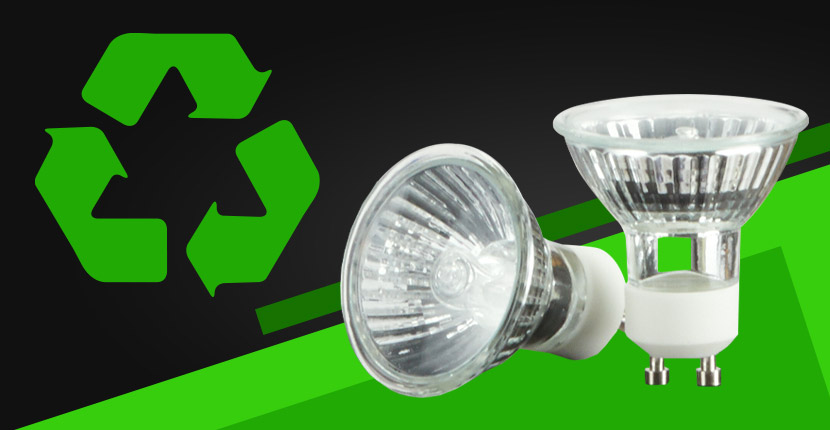How to Dispose of Halogen Light Bulbs
- by Bryan Veldboom - updated on 3/30/2022

Halogen light bulbs have been around since 1959 when they were introduced as an improved version of the traditional incandescent bulb. While not as efficient as CFLs and LEDs, halogen bulbs are more energy-efficient than incandescent types. Eventually though, halogen bulbs will fail and when they do, it's important to dispose of them properly.
How Does a Halogen Bulb Work?
Halogen bulbs are a type of incandescent light bulb. Both halogen and incandescent bulbs contain a tungsten filament, which produces light when electrical current passes through it. In an incandescent bulb, this tungsten evaporates over time and attaches itself to the surface of the light bulb where it creates black spots on the interior of the glass. This is why incandescent bulbs burn out so quickly.
Halogen bulbs contain a halogen gas which reacts chemically with the evaporated tungsten to redeposit the tungsten atoms on the filament, preventing them from adhering to the bulb's glass. This process allows the filament to last much longer. It also makes it possible for the filament to get much hotter, resulting in more light per unit of energy. In order to compensate for this high level of heat, the glass envelope used in halogens is made of quartz rather than glass.
What are Halogen Light Bulbs Used for?
Halogen bulbs can be used in almost any situation, except for applications where the high heat they produce makes them a liability. Here a few of the more common uses:
- Auto headlights
- Film & slide projectors
- Under-cabinet lighting
- Work lights
- Theater spotlights
- Residential flood lights
- Landscape & security lighting
- Retail display lighting
- Airport landing lights
How Long Do Halogen Bulbs Last?
A halogen bulb typically lasts between 2,000 and 4,000 hours, while an incandescent bulb only lasts between 750 and 2,000 hours. Halogens are definitely an improvement, but they're not as efficient as CFL and LED options. A CFL bulb can last upwards of 20,000 hours, while an LED option can last up to 50,000 hours. For more information on bulb lifespan, read our blog entitled "What Kind of Light Bulb Lasts the Longest."
Are Halogen Light Bulbs Recyclable?
Halogen bulbs can be recycled, however, due to the specialized processes needed to recycle them, you can't just place them in your municipal recycling bin. Instead, you have to find a recycling center that can break them down properly. Batteries Plus recycles a wide range of light bulb types, including halogen bulbs. You can bring your old halogen bulbs to your nearest store for recycling. Before you do though, be sure to store them in a way that will help prevent them from breaking. We suggest wrapping them in bubble wrap or a similar cushioning material. You can also safely store them in their original packaging.
Keep in mind that due to differences in state and local regulations, there is some variation in which recyclables your store may accept. There may also be a cost for recycling, although this too will vary by location. For the most accurate information, contact your local store and ask them what types of materials they accept.
Are Halogen Light Bulbs Hazardous Waste?
Halogen bulbs do not contain mercury or any other harmful components, so if you don't have a way of recycling them, they are safe to throw in the trash. Before you do though, be sure to protect them so that they don't break and cause injury. You can do this by wrapping them in newspaper or some other heavy paper, or by throwing them out in their original container.
Shop Lighting Solutions at Batteries Plus
Looking for a replacement bulb for your home, vehicle or business? Batteries Plus has you covered. Shop our selection of light bulb types, including halogen options. You can also learn more about lighting terminology in our Lighting Purchasing Guide, find out what materials we recycle on our Recycling Page or read some helpful lighting tips in our blog. Some related topics include "How to Save Money Using Energy-Efficient Light Bulbs" and "Lighting Tips that are Easy on the Eye."